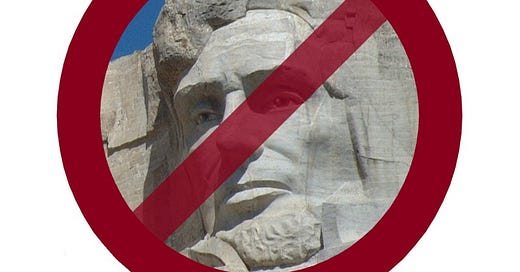Dishonest Abe’s Birthday Bash!
The Mythologizing of Tyrants Persists, Even In the ‘Land of the Free’
If you enjoy this article, please click Like (❤️) to help others find my work.
Born 216 years ago today — Feb. 12, 1809 — Abraham Lincoln seems to have been an orderly and even-keeled young man. Stories abound from his days as a clerk at Denton Offutt’s general store in New Salem, Illinois … how he physically removed rude men from the small building … how he dutifully returned money he had overcharged a lady … how he made good on measurement errors when weighing items for sale.
It was enough to earn him a reputation as “honest,” a term that would eventually become a moniker for “Honest Abe.”
Political ambitions would follow. As expected from such goals, his ethics would be tested and exposed for what they really are.
Of course, when I attended government schools here in the U.S., and “private” schools that still followed the government-school model, I learned that Lincoln was a hero, an icon, a mythological figure in American history.
He has his own ancient-godlike monument in Washington, D.C.!
He’s on coin and paper money!
He’s on Mount Rushmore!
And he also routinely tops lists of greatest presidents, as determined by modern professional historians.
Popular culture and scholarship delight in imposed, hierarchical social order. “Greatness” is awarded for warmongering and increasing the might-makes-right size and scope of government.
Anarchist/voluntarist thinkers and especially those who profess to be Christian should take issue with the “greatness” of Lincoln and any other political overlord.
Lincoln’s manipulative — dishonest! — streak
Let’s start with what Lincoln is lauded for: allegedly preserving “the Union” of the U.S. when several southern states wanted to secede from the federal agreement in the 1861 and form a new Confederacy of states. What followed was the Civil War.
But Lincoln actually destroyed the consent-based nature of the union of states and replaced it with a forced nationalism. And he dishonestly manipulated public opinion and Constitutional authority to accomplish it.
I broached this subject in the Sunday Buffet podcast for Jan. 26, referencing a critique of a new book on Robert E. Lee, who commanded the army of the Confederacy. Lincoln, as president and commander in chief of the U.S. armed forces, effectively ordered an invasion of what had become foreign territory.
But wasn’t Lincoln trying to end slavery? Didn’t he declare this in the Emancipation Proclamation? Well, no.
The Proclamation didn’t emerge until two years after the Civil War began. And Lincoln calculatingly — and dishonestly, again — only “freed” slaves if they were held in the territories that “are this day in rebellion against the United States.” Slavery persisted in states that didn’t join the Confederacy, and Lincoln carved out exceptions even within Confederacy states that would be “left precisely as if this proclamation were not issued.”
And since Lincoln levied the first-ever income tax in U.S. history and a proto-IRS, he’s the forerunner of the enslavement of everyone in the U.S. who dares to earn a living.
OK, but wasn’t he at least attempting to preserve “liberty” and a “government of the people, by the people, for the people” as stated in the famous Gettysburg Address? Well, no, again.
Lincoln’s sloganeering in the Address was merely that. I’ve written previously about the empty labels of the French Revolution and how Aleksandr Solzhenitsyn laid bare the hypocrisy of “liberty, equality, fraternity.” In Lincoln’s Address, delivered 11 months later in 1863 than his Proclamation, he again very dishonestly frames what was actually “brought forth” in the “four score and seven years ago” (which would be 1776, via the Declaration of Independence).
The Gettysburg Address calls the result of the Declaration of Independence “a new nation.” One problem: The Declaration doesn’t refer to the creation of a new nation, but to already-existing political bodies that simply want to secede from Great Britain. The only time the Declaration uses the word “nation” is when saying the “King of Great Britain” is “totally unworthy the Head of a civilized nation.”
They were explicitly leaving, not creating a nation.
The “people” on the side of “liberty” in 1776 were doing exactly what the tyrannical, hypocritical Lincoln violently opposed “four score and seven years” later!
Authoritarianism in disguise
Lincoln’s birthday used to be a U.S. holiday, but it has since been replaced by Presidents Day, which falls between Lincoln’s and George Washington’s (Feb. 22) birthdays. The Presidency, having been turned into a quasi tyranny by Lincoln, is now celebrated as an institution, and every occupant is honored for violating people’s lives and livelihoods.
And the more authoritarian, the more the president is admired! The one who occasionally trades the top spot in scholarly and popular polls with Lincoln, Franklin D. Roosevelt, was an extreme tyrant domestically and a warmonger, too.
Thankfully, more historians like Thomas Di Lorenzo, whose speech, “Axis of Evil: America’s Three Worst Presidents,” can be heard at this link or embedded right here in this article …
… are speaking out about how these are really the worst, not best, presidents.
But there’s still much to do to reduce the fanatical religion of government that molds too many people’s beliefs.
Cynicism about government likely isn’t enough, as that simply makes people look for different clowns to lead the circus. There has to be something positive to encourage each other to pursue, rather than merely things to avoid.
Perhaps, with enough of us doing our responsible parts, we can undermine the imposed nation of good citizens, and spontaneously reveal an Anti-Government of the good neighbors, by the good neighbors, and for the good neighbors.
Four score and seven Comments …
I’m kidding; there’s no need to leave 87 Comments.
But it’d be the good kind of “greatness” if you shared your thoughts below!
What were you taught about Lincoln and other presidents in school? Does it match what you’ve learned from further study?
Who are your three worst presidents and why? Same as Thomas DiLorenzo’s (Lincoln, Woodrow Wilson, FDR)?
Anything else stand out to you about this article’s themes?
Let me know your thoughts below …
—
Find the book, Good Neighbor, Bad Citizen:
Amazon (paperback & Kindle)
Barnes&Noble (paperback)
Lulu (paperback)
Find me on X: https://x.com/GoodNeighBadCit







Excellent points Dom! I listened to a book from the Mises institute this year that explained just how brutal Lincoln was. I was shocked, but knowing the track record of government, I shouldn't have been.
Good piece.
Tom's earlier book "The Real Lincoln" is a MOA shot of re-education about America's 16th Tyrant. As the new President of the Mises Institute, Tom continues to crank out great reads.